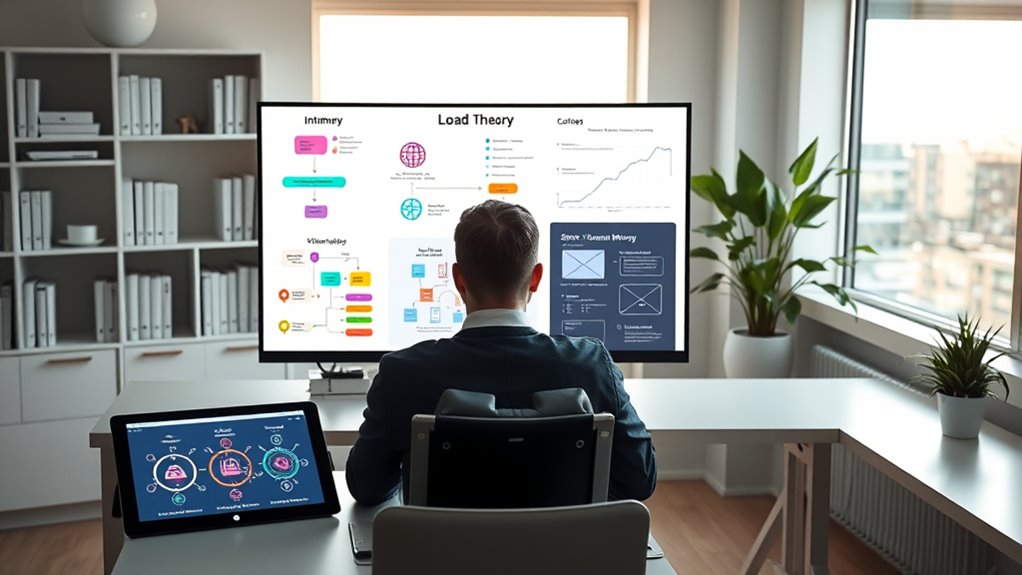Cognitive Load Theory explains how your brain processes information and why overload hampers your learning and productivity. Your working memory has limited capacity, so managing intrinsic, extraneous, and germane loads is essential. To stay efficient, you should simplify complex tasks, organize your workspace, and break projects into manageable steps. Recognizing signs of mental fatigue helps prevent burnout. Continue exploring to discover practical strategies to optimize your mental workload and work smarter.
Key Takeaways
- Cognitive Load Theory explains how working memory’s limited capacity affects learning and task performance.
- It categorizes load into intrinsic (task complexity), extraneous (poor design), and germane (schema building).
- Managing cognitive load involves reducing unnecessary information and using techniques like chunking and scaffolding.
- Well-designed workflows and organized environments help minimize extraneous load for knowledge workers.
- Applying the theory enhances learning, productivity, and skill transfer by optimizing mental effort and focus.
What Is Cognitive Load Theory and Why It Matters

Cognitive Load Theory explains how the human brain processes information and why certain instructional methods are more effective than others. When you learn new concepts, your brain invests mental effort to process and understand information. This processing involves managing working memory, which has limited capacity. If too much information is presented at once, your cognitive load increases, making learning harder and reducing retention. By understanding how cognitive load impacts information processing, you can design learning experiences that minimize unnecessary mental effort. This understanding also highlights the importance of information overload and how it can hinder effective learning. Effective instructional design considers working memory limitations to prevent cognitive overload, thereby facilitating better comprehension. Recognizing the importance of learning efficiency in instructional strategies helps your brain focus on core ideas, making learning more efficient. Additionally, incorporating chunking techniques can further reduce cognitive load by organizing information into manageable segments. This helps your brain focus on core ideas, making learning more efficient. Recognizing the importance of managing cognitive load allows you to optimize instruction, improve comprehension, and enhance overall learning effectiveness.
The Three Types of Cognitive Load
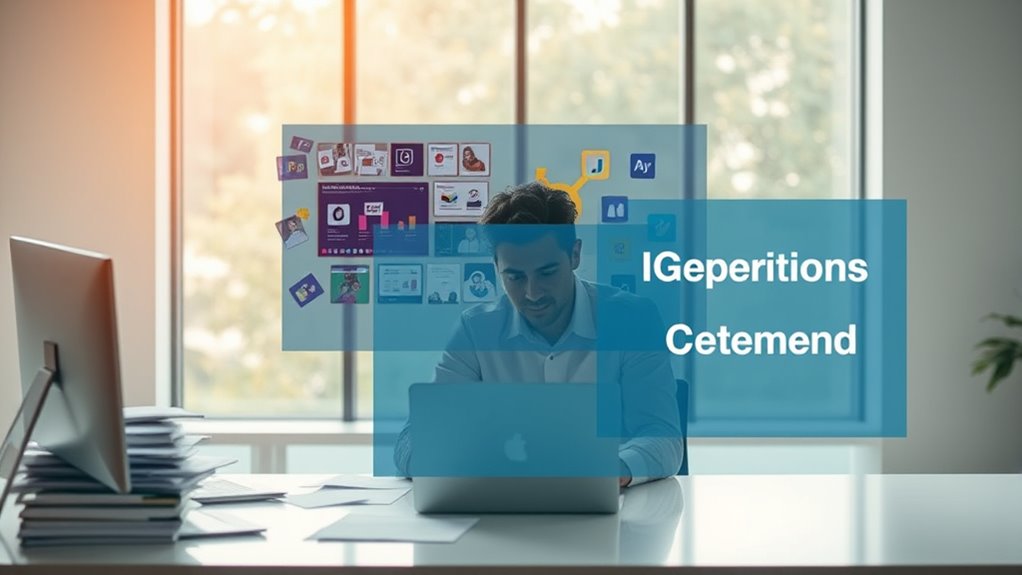
Understanding how your brain manages different types of mental effort can help you optimize learning. The three types of cognitive load are extraneous, intrinsic, and germane load. Extraneous load results from poorly designed tasks or unnecessary information, which can distract you and hinder understanding. Poorly designed tasks can significantly increase extraneous load, making it harder to focus on essential information. Intrinsic load depends on the complexity of the material and your prior knowledge, affecting how much mental effort is needed to process it. Effective task design can help minimize extraneous load by presenting information clearly and concisely. Additionally, mental resource allocation plays a crucial role in balancing these loads to maximize learning efficiency. Germane load is the mental effort dedicated to constructing and automating schemas, or mental frameworks, that improve learning. Managing these loads involves reducing extraneous load and supporting germane load, so your brain can focus on meaningful learning. Techniques such as sound design principles can be applied to optimize auditory environments for focused work and learning.
How Working Memory Influences Learning and Performance

Because working memory temporarily holds and manipulates information, it plays a crucial role in how effectively you learn and perform tasks. Your mental bandwidth is limited, meaning you can only process a certain amount of information at once. This capacity affects your ability to absorb new concepts and execute complex tasks efficiently. When your working memory becomes overloaded, your performance declines, and learning slows down. To optimize information processing, focus on reducing unnecessary details and chunking information into manageable units. Additionally, understanding the cognitive load involved in tasks can help in designing more effective learning strategies. Recognizing the importance of working memory capacity can guide the development of tools and methods that prevent overload and enhance learning outcomes. Strategies such as information chunking and minimizing extraneous details can further support effective learning. Moreover, the intrinsic cognitive load of a task influences how much information your working memory can handle at once.
Recognizing Signs of Cognitive Overload

Have you ever felt mentally drained or found it hard to concentrate after tackling a complex task? These are clear stress signals that your cognitive load might be overwhelming. You might notice attention lapses, where your focus drifts or you forget key details. You could also experience increased frustration or a sense of being mentally foggy. When your working memory is overloaded, your ability to process information diminishes, leading to mistakes or missed deadlines. Physical signs like headaches or eye strain might also appear. Recognizing these signs early helps you understand when your cognitive resources are stretched too thin. Being aware of cognitive overload and its effects can help you implement strategies to manage your mental workload effectively. Developing awareness of mental fatigue can enable you to better monitor your cognitive state and take proactive steps to prevent burnout. Additionally, understanding the importance of auditory processing can assist in identifying specific challenges that contribute to mental strain. For instance, recognizing how necessary cookies enable basic functionalities might serve as a metaphor for identifying essential versus non-essential mental tasks. By paying attention to these cues, you can take steps to pause and reset before further overload hampers your productivity and decision-making.
Strategies to Manage and Reduce Cognitive Load
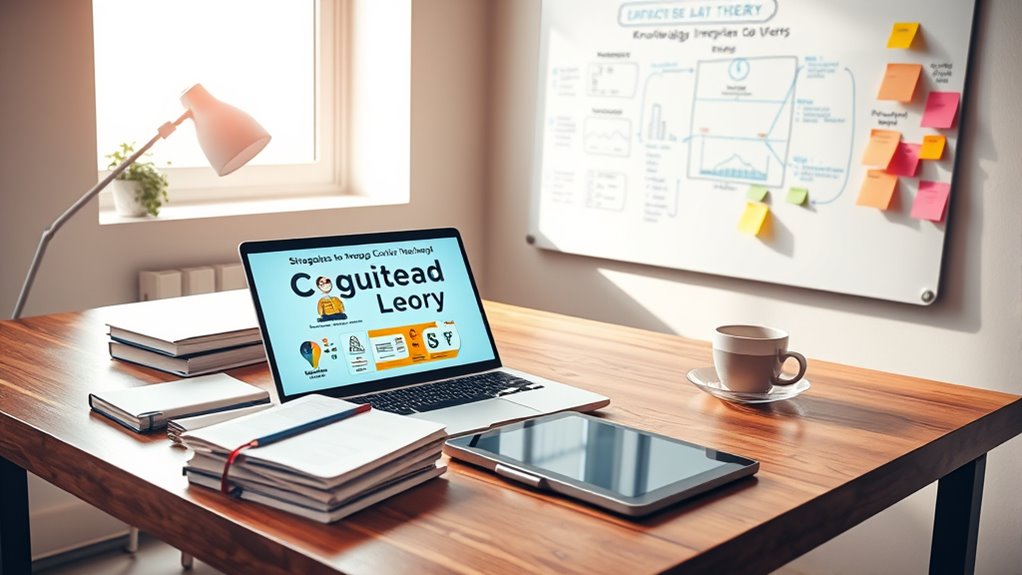
When you notice signs of cognitive overload, taking proactive steps can help lighten your mental load and improve your focus. One effective strategy is practicing mindfulness techniques, which help you stay present and reduce mental clutter. Regular mindfulness exercises, like deep breathing or brief meditation, can calm your mind and enhance clarity. Additionally, task prioritization plays a pivotal role: break your work into manageable chunks, identify urgent tasks, and focus on high-impact activities first. Avoid multitasking, which can increase cognitive strain, by concentrating on one task at a time. Incorporating tools and techniques from cognitive load theory can further help optimize your mental resources and reduce overload. For example, understanding how divorce statistics impact decision-making can help you prepare better for complex situations. Furthermore, understanding the relationship between stress and cognitive function enables you to implement targeted stress reduction techniques that support mental clarity. By combining mindfulness and prioritization, you can better control your mental resources, prevent burnout, and maintain productivity even during demanding periods. These strategies support sustainable work habits and mental resilience. Incorporating techniques to manage cognitive load can also improve your overall efficiency and decision-making abilities.
Designing Workspaces and Tasks for Optimal Mental Efficiency
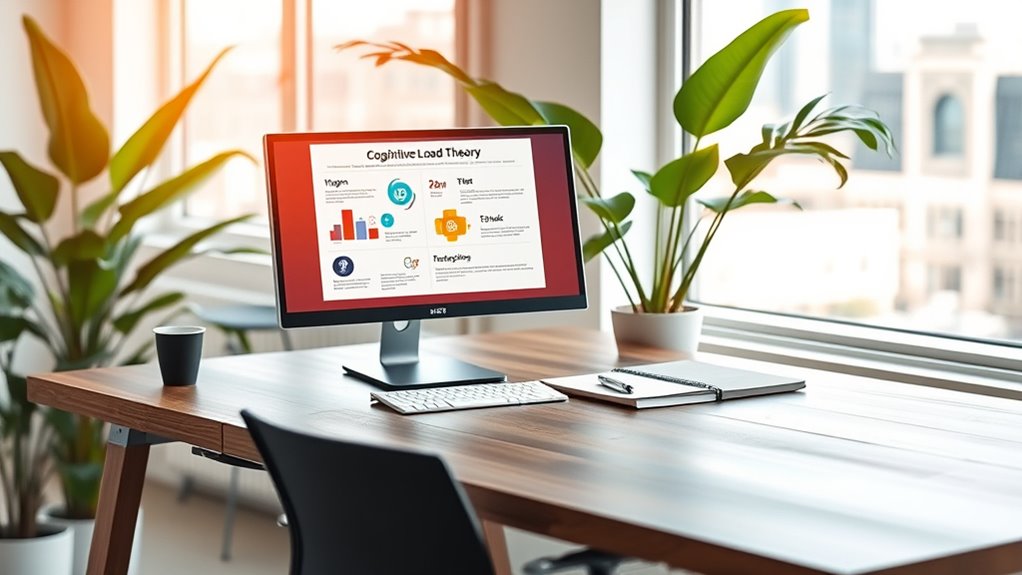
A well-designed workspace and thoughtfully structured tasks can considerably enhance your mental efficiency. Start with ergonomic furniture to reduce physical strain and minimize unnecessary cognitive load, allowing you to focus better. Guarantee your workspace is organized, with essentials within easy reach, so you don’t waste mental energy searching for tools. Control ambient noise by using noise-canceling headphones or selecting quiet environments, which helps prevent auditory distractions that increase extraneous load. Adjust lighting to avoid glare and eye strain, maintaining your focus longer. Break complex tasks into manageable steps and set clear priorities to prevent overload. Additionally, incorporating effective wicking materials can help maintain a clean and organized environment, reducing mental clutter. Using mindfulness techniques can further help in managing mental load and improving focus. By optimizing your environment and task structure, you create a setting that supports sustained concentration and efficient mental processing, boosting your overall productivity and reducing mental fatigue. Recognizing the importance of remote work flexibility can further help in designing an optimal workspace that adapts to your personal needs. Incorporating techniques such as active listening and empathy can further improve your focus and interpersonal understanding.
The Role of Chunking and Scaffolding in Learning
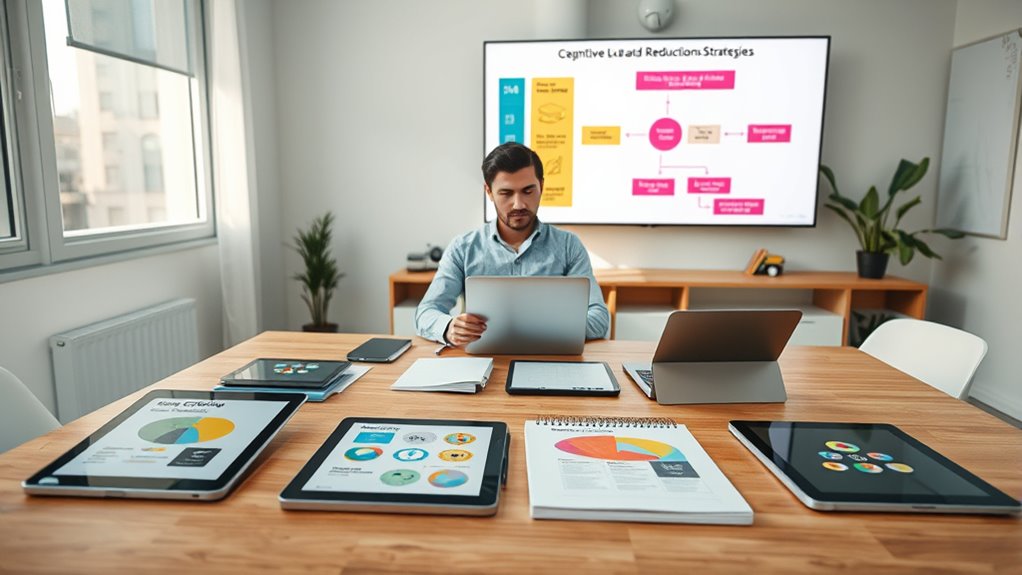
Chunking and scaffolding are essential strategies that simplify complex information and support effective learning. By grouping related concepts, you create memory aids that reduce cognitive load, making it easier to retain and recall information. Memory capacity can be expanded through these techniques, allowing more information to be processed simultaneously. Scaffolding provides step-by-step guidance, helping you build skills gradually and enabling skill transfer to new tasks. Here’s a quick overview:
| Strategy | Purpose | Example |
|---|---|---|
| Chunking | Reduce memory overload | Breaking a report into sections |
| Scaffolding | Support skill development | Providing prompts or templates |
| Memory Aids | Enhance retention | Mnemonics, visual cues |
| Skill Transfer | Apply learned skills broadly | Using presentation skills in meetings |
| Effect | Improve learning efficiency | Faster, more durable mastery |
Using these techniques enables you to learn more effectively and apply knowledge confidently. Aesthetic wall organization can also help reduce visual clutter, making it easier to focus on learning tasks and retain information more effectively. Incorporating cognitive load theory principles into your study methods can further optimize your learning process.
Applying Cognitive Load Principles to Boost Productivity
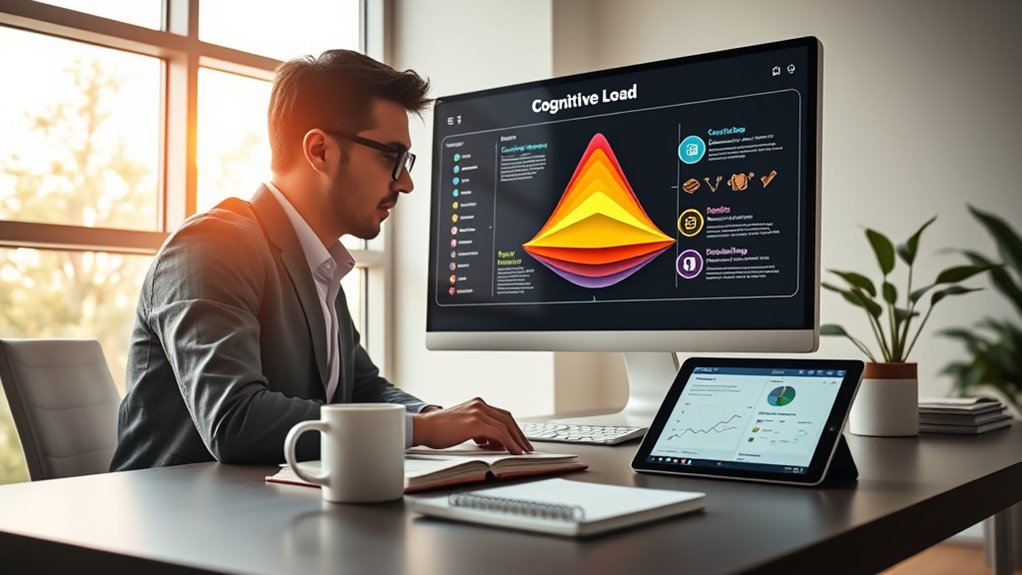
Applying cognitive load principles can considerably enhance your productivity by helping you manage mental effort more effectively. Incorporate mindful breaks into your routine to prevent cognitive overload and maintain focus. Short, intentional pauses allow your brain to reset, reducing fatigue and improving mental clarity. Prioritize mental ergonomics by organizing your workspace and tasks to minimize unnecessary cognitive demands. Break complex projects into smaller, manageable chunks, and avoid multitasking, which increases extraneous load. Use visual aids or checklists to streamline information processing. Regularly evaluating your mental load helps you identify when you’re overwhelmed, prompting you to adjust your approach. By consciously applying these principles, you’ll work more efficiently, preserve mental energy, and sustain high performance over longer periods.
Frequently Asked Questions
How Can Cognitive Load Theory Improve Remote Work Productivity?
You can boost remote work productivity by applying cognitive load theory through task prioritization and information filtering. Focus on essential tasks first, reducing mental clutter. Limit distractions by filtering out unnecessary information, so your brain isn’t overwhelmed. This approach helps you stay organized, improves focus, and prevents burnout. When you manage your cognitive load effectively, you work smarter, not harder, making remote work more efficient and less stressful.
What Are Common Myths About Cognitive Load in Professional Settings?
Imagine your mind as a busy highway. Many believe that multitasking is like adding more lanes to speed up traffic, but myths surrounding multitasking often cause misconceptions about overload. People think they can handle multiple tasks effortlessly, but in reality, this overload hampers focus and productivity. Don’t fall for these myths—your brain works best when it’s not overloaded, and managing tasks one at a time keeps traffic flowing smoothly.
How Does Multitasking Affect Cognitive Load and Task Performance?
When you multitask, you often experience increased cognitive overload, which negatively impacts your task performance. Multitasking effects include dividing your attention, making it harder to focus on each task effectively. This split attention can lead to mistakes and slower progress. Instead of multitasking, try concentrating on one task at a time to reduce cognitive overload and improve your efficiency and accuracy.
Can Cognitive Load Theory Help in Managing Workplace Stress?
You can use cognitive load theory to manage workplace stress by reducing your mental effort and avoiding overload. Focus on stress reduction through workload management—break tasks into smaller parts, prioritize important activities, and minimize distractions. This approach helps your mind stay organized and prevents burnout. By managing your cognitive load effectively, you’ll experience less stress, work more efficiently, and maintain better overall mental health at your job.
What Tools or Software Support Cognitive Load Management for Knowledge Workers?
You can manage cognitive load with tools like mind mapping and note-taking software. Mind mapping helps you organize complex ideas visually, reducing mental clutter. Note-taking apps allow you to capture information quickly, freeing your mind for critical thinking. These tools streamline your workflow, making it easier to focus and avoid overwhelm. By using them consistently, you’ll handle workload more effectively and stay productive without feeling overloaded.
Conclusion
By understanding cognitive load, you’re like a skilled captain steering the treacherous seas of information. When you manage your mental resources wisely, you prevent overload and stay focused on your goals. Remember, even Sherlock needed his moments of pause to solve the mystery. Apply these principles to your work, and you’ll master the art of mental clarity, turning chaos into clarity and boosting your productivity with the finesse of a seasoned detective.
